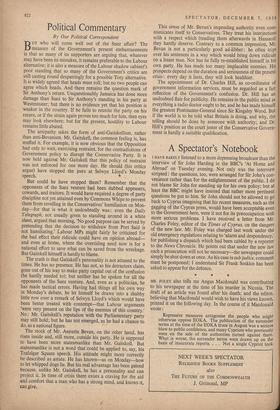Political Commentary
By Our Political Correspondent BUT who will come well out of the Suez affair? The measure of the Government's present embarrassments is that so many of its supporters are arguing that, whatever may have been its mistakes, it remains preferable to the Labour alternative; it is also a measure of the Labour shadow cabinet's poor standing that so many of the Government's critics are still casting round despairingly for a possible Tory alternative. It is widely agreed that heads must roll; but no two people can agree Which heads. And there remains the question mark of Sir Anthony's return. Unquestionably Jamaica has done more damage than Suez to Sir Anthony's standing in his party at Westminster; but there is no evidence yet that his position is weaker in the country. If he fails to reunite the party on his return, or if the strain again proves too much for him, then eyes may look elsewhere; but for the present, hostility to Labour remains little abated. BUT who will come well out of the Suez affair? The measure of the Government's present embarrassments is that so many of its supporters are arguing that, whatever may have been its mistakes, it remains preferable to the Labour alternative; it is also a measure of the Labour shadow cabinet's poor standing that so many of the Government's critics are still casting round despairingly for a possible Tory alternative. It is widely agreed that heads must roll; but no two people can agree Which heads. And there remains the question mark of Sir Anthony's return. Unquestionably Jamaica has done more damage than Suez to Sir Anthony's standing in his party at Westminster; but there is no evidence yet that his position is weaker in the country. If he fails to reunite the party on his return, or if the strain again proves too much for him, then eyes may look elsewhere; but for the present, hostility to Labour remains little abated.
The antipathy takes the form of anti-Gaitskellism, rather than anti-Bevanism. Mr. Gaitskell, the common feeling is, has muffed it. For example, it is now obvious that the Opposition had only to wait, exercising restraint, for the contradictions of Government policy to disrupt the Conservative Party. It is now held against Mr. Gaitskell that this policy of restraint was not enforced for one more day. He should (his critics argue) have stopped the jeers at Selwyn Lloyd's Monday speech.
But could he have stopped them? Remember that the opponents of the Suez venture had been dubbed appeasers, cowards, and traitors. It would have required a degree of party discipline not yet attained even by Commons Whips to prevent them from revelling in the Conservatives' humiliation on Mon- day—for that is what it undoubtedly was : even the Daily Telegraph, not usually given to standing around in a white sheet, argued that morning, 'No good purpose can be served by pretending that the decision to withdraw from Port Said is not humiliating.' Labour MPs might fairly be criticised for the bad effect their ridicule could have on opinion abroad— and even at home, where the overriding need now is for a national effort to save what can be saved from the wreckage. But Gaitskell himself is hardly to blame.
The truth is that Gaitskell's personality is not attuned to the times. He has no presence. He has not, as his detractors claim, gone out of his way to make party capital out of the confusion (he hardly needed to); but neither has he spoken for all the opponents of the Suez venture. And, even as a politician, he has made tactical errors. Having had things all his own way in Monday's debate, he let himself be drawn into a shabby little row over a remark of Selwyn Lloyd's which would have been better treated with contempt—that Labour arguments `were very present on the lips of the enemies of this country.' No : Mr. Gaitskell's reputation with the Parliamentary party may still hold; but he has not emerged, as he had a chance to do, as a national figure.
The stock of Mr. Aneurin Bevan, on the other land, has risen inside and, still more, outside his party. He is supposed to have been more statesmanlike than Mr. Gaitskell. But statesmanlike is not a word that could be applied to, say, his Trafalgar Square speech. His attitude might more correctly be described as astute. He has known—as on Monday—how to let whipped dogs lie. But his real advantage has been gained because, unlike Mr. Gaitskell, he has a personality and can project it. In time of crisis there exists a craving for the aid and comfort that a man who has a strong mind, and knows it, can give. This sense of Mr. Bevan's impending authority even com- municates itself to Conservatives. They treat his interjections with a respect which (reading them afterwards in Hansard) they hardly deserve. Contrary to a common impression, Mr. Bevan is not a particularly good ad-libber: he often trips over his sentences in a way which would bring down ridicule on a lesser man. Nor has he fully re-established himself in his own party. He has made too many implacable enemies. His prospects depend on the duration and seriousness of the present crisis : every day it lasts, they will look healthier. The appointment of Dr. Charles Hill, as co-ordinator of government information services, must be regarded as a fair reflection of the Government's confusion. Dr. Hill has an undoubted flair for publicity. He remains in the public mind as everything a radio doctor ought to be; and he has made himself the greatest Postmaster-General since Sir Kingsley Wood. But if the world is to be told what Britain is doing, and why, the telling should be done by someone with authority; and Dr. Hill's position as the court jester of the Conservative Govern- ment is hardly a suitable qualification.


































 Previous page
Previous page